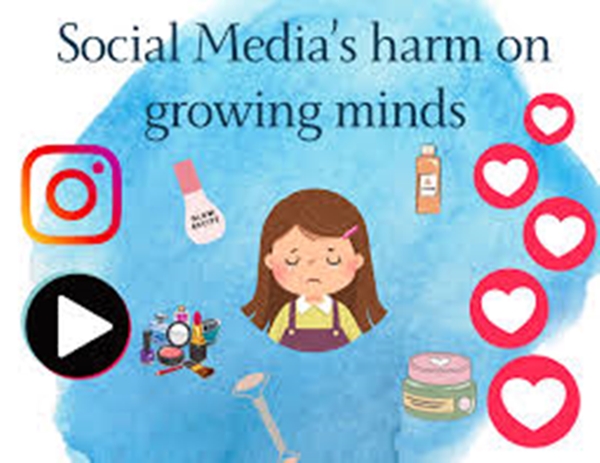In this article, we discussed how social media harms children. We started by explaining the terms social media.
Definition
Social media is a collective term for websites and applications that focus on communication, community-based input, interaction, content-sharing and collaboration. People use social media to stay in touch and interact with friends, family and various communities.
Ways Social Medial Can Harm Children
Young minds are moldable, and social media can affect how your child thinks or behaves. At their age, they are innocent and cannot discern good and bad. Some common adverse effects may be:
Mental health: Children who spend more than three hours a day on social media is twice as likely to experience mental health problems like depression and anxiety. Social media can also affect impulse control, emotional regulation, and sensitivity to rewards and punishments.
Sleep: Using media in bedrooms can disrupt sleep.
School performance: This can distract kids from homework and hurt school performance.
Excessive use of technology and the internet, including teen social media addiction, gaming addiction and internet addiction, can hinder children’s productivity by consuming significant amounts of their time without engaging in meaningful activities
Cyberbullying: social media can expose kids to cyberbullying, which can lead to depression and suicide.
Online communication has led to a growing trend of cyberbullying, particularly on social media and messaging platforms. It spreads fear and shame among people and may have undesirable effects on children.
Inappropriate content: Children may be exposed to mean, aggressive, violent, or sexual comments or images. it is a vast platform, and one cannot control the amount of information available here. Therefore, children may bump into inappropriate or harmful content that may affect their thinking.
Risky behavior: Children may upload embarrassing or provocative photos or videos of themselves or others.
Targeted advertising: Advertisers may use a child’s personal information to influence the advertisements they see.
Data breaches: A child’s data might be sold to organizations they don’t know about.
Pressure to engage: Children might feel pressure to maintain a “streak” or retain followers.
Lack of real-time communication: Online communication is often stripped of many of the most personal aspects of communication.
Makes children less productive because much of their time is spent without doing anything important, and they become addicted. These addictions may adversely affect their physical health.
Excessive use of technology and the internet, including teen social media addiction, gaming addiction and internet addiction, can hinder children’s productivity by consuming significant amounts of their time without engaging in meaningful activities. These addictions may adversely affect their physical health.
Excessive social media use may also affect your child’s ability to develop interpersonal relationships.
Excessive internet and it use have been linked to various mental health issues in children such as depression, poor sleep, increased physiological arousal, decreased attention, hyperactivity, aggression, antisocial, fearful behaviour, social isolation, and anxiety about conforming to social norms.
Changes in their daily behaviour
In addition to problematic digital behaviors, there may be changes in children’s daily behavior at home, like:
- Increased irritability.
- Increased anxiety.
- Increased depression.
- Increased sleep issues.
- Lack of self-esteem.
- Lack of focus and concentration
Conclusion
“For many parents, this is unexplored territory,” Dr. Eshleman realizes. “It takes time and energy, and it can be difficult for parents who are working, raising children and managing household tasks. It’s OK to ask for help. Don’t be afraid to talk to other parents and caregivers about what they do, or ask for help if you’re struggling with how to direct social media and keep your kids safe.

